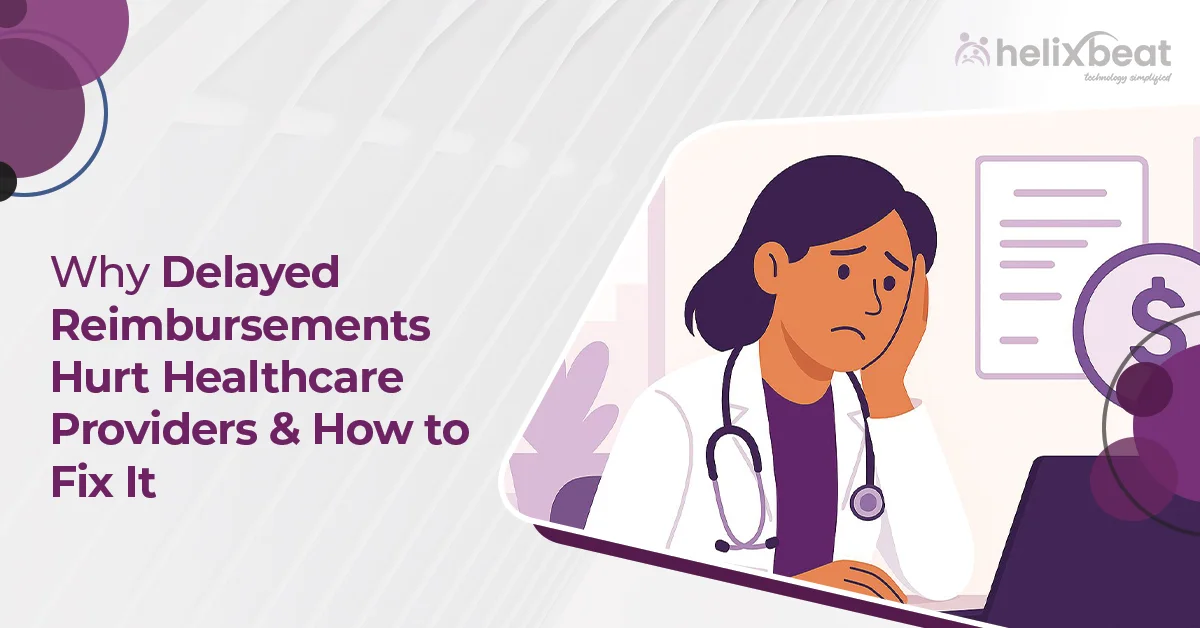Table of Contents
Introduction
Did you know that 60% of healthcare providers face cash flow issues due to delayed reimbursements? In an industry where timely funding is crucial, waiting weeks or months for payments from insurers and patients can cripple operations. Hospitals struggle to pay staff, small clinics risk shutting down, and doctors find themselves buried in administrative tasks instead of focusing on patient care.
Beyond the financial strain, delayed reimbursements lead to increased write-offs, reduced service quality, and compliance headaches. So, why do these delays happen, and what can healthcare providers do to fix them?
This blog explores the impact of delayed reimbursements, the reasons behind them, and how innovative payment solutions like Paynova can revolutionize the reimbursement process to ensure providers get paid faster and more efficiently.
The Impact of Delayed Reimbursements on Healthcare Providers
1. Cash Flow Disruptions
Delayed reimbursements create significant cash flow issues for healthcare providers. When insurance companies take months to process claims, hospitals and clinics struggle to meet their financial obligations, including staff salaries, medical equipment purchases, and operational costs.
A disrupted cash flow can force providers to take out loans or delay investments in advanced medical technologies, which ultimately affects patient care and organizational growth.
2. Increased Administrative Burden
Processing claims, following up on payments, and handling reimbursement disputes place a heavy administrative burden on healthcare providers. Medical billing teams must continuously track claims, resubmit denied claims, and reconcile payments, diverting valuable time and resources from patient care.
With complex coding systems and ever-changing insurance policies, billing departments face a constant challenge to ensure claims are correctly submitted. Even a small error can lead to claim denials or delays, further complicating the payment process.
3. Negative Impact on Patient Care
Healthcare providers rely on a steady revenue stream to maintain operations, invest in new treatments, and offer high-quality care. Delayed payments mean fewer resources for hiring skilled professionals, purchasing essential medical supplies, and upgrading facilities.
Additionally, when providers face financial instability, they may reduce services or limit the number of patients they see, leading to increased wait times and lower patient satisfaction.
4. Higher Write-Offs and Unpaid Bills
When reimbursement delays extend beyond a certain period, providers are often forced to write off unpaid claims as losses. This affects the financial stability of healthcare institutions, particularly small practices that cannot afford high volumes of unpaid claims.
Unpaid medical bills also place stress on providers who need to negotiate with collection agencies or absorb the financial hit, further impacting overall profitability.
5. Struggles with Compliance and Regulatory Requirements
Healthcare providers must adhere to strict compliance and regulatory requirements when handling payments. From HIPAA regulations to PCI-DSS compliance for secure transactions, navigating these requirements adds another layer of complexity.
Delayed reimbursements often result from non-compliance issues, such as incorrect claim submissions or missing patient data. Without efficient payment processing systems in place, providers risk non-compliance penalties and further payment disruptions.

Why Do Reimbursement Delays Happen?
- Errors in Claim Submission
One of the leading causes of delays is mistakes in the initial claim submission. Missing patient information, incorrect billing codes, or incomplete documentation can lead to claim denials or requests for additional information from insurers. For example, a mental health provider submitting a claim without proper diagnostic codes could face weeks of back-and-forth before approval.
- Insurance Company Processing Times
Even when a claim is submitted correctly, insurance companies often have internal review processes that take time. Some insurers intentionally delay payments as a cost-saving measure, while others struggle with inefficiencies in their systems. This is especially true for complex cases requiring prior authorization or specialty services like mental health treatments.
- Compliance and Regulatory Hurdles
The healthcare industry is heavily regulated, and compliance with federal and state laws—like HIPAA or specific Medical Licensing Services requirements—can slow things down. If a claim doesn’t meet these standards, it’s sent back for corrections, adding days or weeks to the timeline.
- Lack of Follow-Up
Providers often submit claims and assume the process will run smoothly. However, without proactive tracking and follow-up, claims can sit in limbo. Insurance companies won’t always notify you of issues unless prompted, leaving payments in a holding pattern.
- Payer Policies and Negotiations
Each insurance company has its own policies, reimbursement rates, and timelines. Negotiating with payers or appealing denied claims can extend the wait, especially if your practice lacks the expertise to navigate these waters efficiently.
- Inefficient Claim Processing by Insurance Companies
Insurance companies follow stringent claim review processes, which often lead to delays. Manual reviews, claim adjudication backlogs, and policy verification steps contribute to slow reimbursements. In some cases, insurers may request additional documentation, further prolonging the process.
- Coding Errors and Claim Denials
Medical billing errors, such as incorrect codes or missing information, are common reasons for claim denials. Providers must then correct these mistakes and resubmit claims, adding weeks or even months to the reimbursement timeline.
- Complex Payment Structures
Different insurance providers have varying policies and payment structures, making it difficult for healthcare organizations to track and manage payments efficiently. When claims are processed manually, errors and delays are inevitable.
- Patient Payment Delays
Many patients struggle with out-of-pocket medical costs and may delay payments, leading to revenue collection challenges for providers. Without clear billing transparency and flexible payment options, patient collections become another bottleneck in the reimbursement process.
- Lack of Payment Automation
Many healthcare providers still rely on outdated billing systems and manual invoicing, which slow down the payment cycle. Automated payment solutions can significantly reduce processing times and improve reimbursement efficiency.

How has Paynova fixed delayed reimbursement?
1. Automating Payment Workflows
How It Works
PayNova reduces manual intervention in billing and claim submission by automating the entire workflow. The system integrates with existing Electronic Health Records (EHRs) and Practice Management Systems (PMS) to generate, submit, and track claims without human input.
Benefits to Healthcare Providers
- Eliminates Human Errors: Manual data entry often leads to incorrect patient details, insurance codes, and missing documentation. PayNova automates these processes, ensuring accuracy and reducing denials.
- Speeds Up Reimbursement: Automated workflows ensure claims are submitted immediately after services are provided, reducing payment wait times.
- Improves Efficiency: Staff members no longer have to manually track claims, allowing them to focus on patient care instead of billing issues.

2. Faster Claim Processing & Insurance Reimbursement
How It Works
PayNova directly connects with insurance companies to submit claims electronically. If a claim is denied, it is automatically corrected and resubmitted, ensuring quick resolution.
Benefits to Healthcare Providers
- Reduces Claim Denials: PayNova ensures that claims include all required details before submission, reducing the risk of rejection.
- Minimizes Administrative Work: Staff members don’t have to manually correct errors or resubmit claims, saving time and effort.
- Speeds Up Payments: Faster processing means healthcare providers receive payments quickly, improving cash flow.

3. Instant Patient Payment Collection
How It Works
Patients can make payments instantly through credit/debit cards, digital wallets, or flexible payment plans. PayNova also enables automated recurring payments for patients with outstanding balances.
Benefits to Healthcare Providers
- Reduces Outstanding Balances: Many patients delay payments due to financial constraints. PayNova’s installment plans allow them to pay in smaller amounts over time.
- Improves Cash Flow: Instant transactions ensure healthcare providers receive payments faster, reducing dependency on insurance reimbursements.
- Enhances Patient Experience: Convenient payment options make it easier for patients to clear their bills, reducing disputes and improving satisfaction.

4. Preauthorization and Insurance Verification
How It Works
PayNova verifies insurance details in real-time before services are provided. It checks if a patient’s insurance covers the treatment and whether preauthorization is required.
Benefits to Healthcare Providers
- Reduces Claim Denials: Many claims are denied due to missing preauthorization. PayNova ensures approvals are secured before treatment.
- Prevents Unpaid Bills: Patients are informed of their out-of-pocket costs upfront, avoiding payment disputes later.
- Improves Efficiency: Staff members don’t have to call insurance companies manually, saving time and effort.

5. Reducing Administrative Delays
How It Works
PayNova automates claim tracking, denial management, and follow-ups. It alerts healthcare providers if a claim is pending, ensuring quick resolution.
Benefits to Healthcare Providers
- Saves Time: Staff members no longer have to chase insurance companies for updates, as PayNova tracks claims automatically.
- Ensures Faster Payments: Real-time updates ensure that delayed claims are addressed immediately, minimizing financial disruptions.
- Reduces Paperwork: Digital claim management means fewer manual forms and less administrative burden.

6. Secure and Compliant Transactions
How It Works
PayNova follows HIPAA and PCI-DSS regulations to protect patient data and financial transactions. It encrypts all payment details, reducing fraud risks.
Benefits to Healthcare Providers
- Prevents Data Breaches: Secure transactions protect sensitive patient and financial data.
- Ensures Regulatory Compliance: Meeting legal requirements helps providers avoid fines and legal issues.
- Builds Patient Trust: Patients feel safer knowing their data is protected, increasing their confidence in the healthcare provider.

7. Real-Time Reporting and Analytics
How It Works
PayNova provides real-time insights into pending reimbursements, denied claims, and overall revenue trends. It also highlights inefficiencies in the billing process.
Benefits to Healthcare Providers
- Improves Financial Planning: Providers can track revenue flow and anticipate delays, ensuring better financial stability.
- Identifies Payment Issues: Real-time reports help detect patterns in claim denials, allowing providers to address recurring problems.
- Enhances Decision-Making: Data-driven insights help healthcare providers optimize billing strategies and maximize reimbursements.

Final Thoughts: Why PayNova is a Game-Changer
Delayed reimbursements can create financial strain for healthcare providers, affecting their ability to deliver quality care. PayNova fixes these issues by automating billing, expediting claims, and enhancing payment collection.
With features like real-time insurance verification, automated claim resubmission, and instant patient payment options, PayNova ensures healthcare providers get paid faster while reducing administrative burdens.
By adopting PayNova’s smart payment solutions, healthcare providers can improve cash flow, reduce financial stress, and focus on what truly matters—patient care.
Frequently asked questions
1. Why is healthcare billing and reimbursement so challenging?
Healthcare billing and reimbursement are complex due to the ever-changing insurance policies, varying payer requirements, coding errors, and regulatory compliance issues. Delayed payments, claim denials, and administrative burdens add to the difficulty.
2. How can you reduce claim denials in medical billing reimbursement?
To minimize claim denials, healthcare providers should ensure accurate patient information, use correct medical codes, verify insurance eligibility, and submit claims promptly. Regular audits and following up on denied claims also help improve reimbursement rates.
3. How do medical billing services help healthcare providers reduce claim denials and ensure timely reimbursement?
Medical billing services streamline the entire billing process by handling coding, claim submission, and follow-ups. They use advanced software to minimize errors, monitor compliance, and appeal denied claims, ensuring faster and more accurate reimbursements.
4. What are some reputable medical billing services that healthcare providers can rely on for accurate and efficient billing processes?
Some reputable medical billing service providers include Kareo, DrChrono, AdvancedMD, Athenahealth, and PracticeSuite. These companies offer automated solutions to optimize revenue cycle management and reduce administrative burdens.
5. What are the common reasons for claim denials in medical billing?
Common reasons for claim denials include incorrect patient information, coding errors, lack of medical necessity documentation, duplicate claims, expired insurance coverage, and failure to meet pre-authorization requirements.
6. How does outsourcing medical billing benefit healthcare providers?
Outsourcing medical billing reduces administrative workload, improves cash flow, minimizes billing errors, enhances compliance with regulations, and allows healthcare providers to focus on patient care instead of complex billing processes.
7. How can technology improve medical billing and reimbursement?
Technology enhances medical billing by automating claims processing, reducing manual errors, improving accuracy in coding, tracking payments, and providing analytics for better revenue cycle management. AI-driven solutions and EHR integration further streamline the process.
8. What should healthcare providers look for when choosing a medical billing service?
Healthcare providers should consider factors such as experience, compliance with HIPAA regulations, integration with existing systems, customer support, pricing structure, and success rate in reducing claim denials when selecting a medical billing service.














